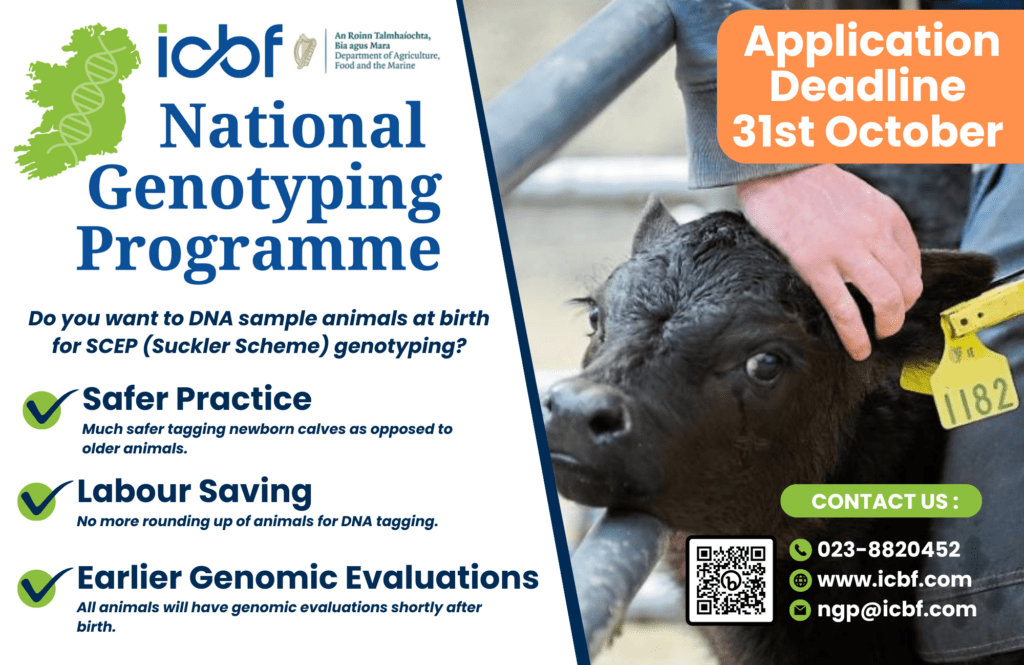
What is the National Genotyping Programme?
The National Genotyping Programme is a collaborative initiative enabling Ireland to take the first step in achieving a fully genotyped national herd. Based on a cost-sharing model between the Department of Agriculture, Food & the Marine, the beef & dairy industry & participating farmers. Genotyping the national herd will provide a huge opportunity for both the Dairy and Beef industry accelerate in the rates of gain of our national breeding indexes (e.g. EBI, Eurostar & DBI), which will enhance farm sustainability & reduce carbon emissions.
What are the main benefits to the farmer?
Labour saving: Farmers signed up to NGP will have exclusive access to Double Tissue Tags. By sampling animals at birth, farmers don’t have to wait for button tags or hair-cards for SCEP or Pedigree Societies and then round up and bring in animals for sampling at a later stage. It is also much safer and easier to tag and sample newborn animals than more mature animals.
Cost: Herds accepted into the National Genotyping Programme will genotype any remaining ungenotyped breeding stock FREE. From 2024 to 2027 (inclusive), farmers will be required to genotype ALL calves born at a reduced cost of approximately €6. (This is an estimate and includes the farmer’s contribution of €4 towards genotyping, plus the additional cost associated with a double tissue tag and postage cost.). Herds participating in SCEP will only incur the €6/calf cost of those calves not counted towards their annual 70% SCEP genotyping requirement.
Parent verification: Parentage errors (which currently sit at an average of 15% nationally) lead to incorrect Eurostar figures and create paperwork to correct once the animal is already registered. Genotyping at birth will confirm parentage & correct any errors prior to registration.
Genomic Eurostar figures: Animals sampled at birth will receive genomic evaluations at the earliest possible opportunity, increasing the reliability of their Eurostar figures well before they are selected/sold for breeding and confirming their eligibility for SCEP.
Commercial Beef Value (CBV): Genotyped weanlings and store cattle that are being traded through marts will have their CBV displayed on mart screens.
Schedule of Fees:

More Information:
-
- The Standard Rate for Genotyping is currently 18 per sample.
-
- The Genotyping fee of €4 for Newborn calves excludes the additional cost of the double tissue tag and postage. The overall cost per animal will be approximately €6.
-
- A direct debit for the genotyping fee for Newborn calves will be triggered once calf tags are ordered with the Tag Provider. This will be collected from the herdowner, by ICBF, approximately within a month of the order.
-
- Membership of HerdPlus or Suckler Cow Efficience Programme (SCEP) is mandatory. Fees for HerdPlus are set out below:

What’s involved?
The programme is scheduled to run initially over a 5-year period.
Preparation: Phase 1 of the programme will involve the genotyping of up to 800,000 beef and dairy cows and breeding stock from participating herds across the country. This will all take place in 2023. Once tags have been received, farmers will have 3 weeks to return samples. There will be no cost to the farmer for sampling these animals. Only breeding animals not already genotyped (e.g. through BDGP, Ped Society etc.) will need to be sampled. Having all the breeding females sampled in advance of the 2024 calving season ensures that the online DNA Registration process works effectively and efficiently i.e. the DNA of a 2024-born calf will match up correctly to its corresponding dam.
Ordering Tags: To avoid any potential issues around tag types, farmers who are accepted into the programme, will only be able to order the specific Double Tissue Tags from their chosen tag supplier. The farmer’s contribution will equate to approximately €6/animal. This includes the cost of genotyping, additional tag cost and postage. All tags must be ordered before the 2024 calving season.
Note: The €4 fee payable for genotyping of newborn calves will be payable to ICBF, after an order for Double Tissue tags has been placed with the tag supplier. This must be paid in advance of any genotyping being processed. For herds participating in SCEP, the genotyping cost deducted from their SCEP gross payment will be adjusted to account for the €6/calf already paid by the herd towards the cost of the genotype, tag and postage of their SCEP samples.
Note: Participating herds must have access to register calves online. Paper registration methods, such as white cards or Animal Events sheets will not be accepted.
DNA Calf Registration: All farmers who avail of the free genotyping in 2023 are now committed to registering their calves via the appropriate DNA Registration channels. This will take place from 2024 to 2027 inclusive and ALL calves on the holding must be registered via the official DNA Registration process.
How will I register calves via the DNA Registration process?
Step 1:
DNA: When the calf is born the farmer tags with a double tissue tag. DNA samples are posted to the Genotyping Lab in the return envelopes provided. It is essential that samples are sent off regularly.It is recommended that you send DNA samples to the lab at least twice per week at peak calving. As calving slows down, it may be sufficient for samples to be sent once per week.
Calf details: All the basic information such as Date of Birth, Sex, Sire, Dam, etc must be recorded as soon as possible. This can be recorded on Agfood.ie or via any of the Farm Software Packages.
Note: Paper registration methods, such as white cards or Animal Events sheets will not be accepted.
BVD: The BVD sample is sent to the BVD lab as normal, and the DNA sample is posted to the Genotyping Lab in the return envelope(s) provided.
Step 2: The sample is received and processed in the genotyping lab and results are sent to the ICBF database.
Step 3: ICBF confirms the parentage and results are made available to the farmer/DAFM.
Step 4: The calf’s passport is issued, and the calf is now fully registered via the DNA Registration process.
